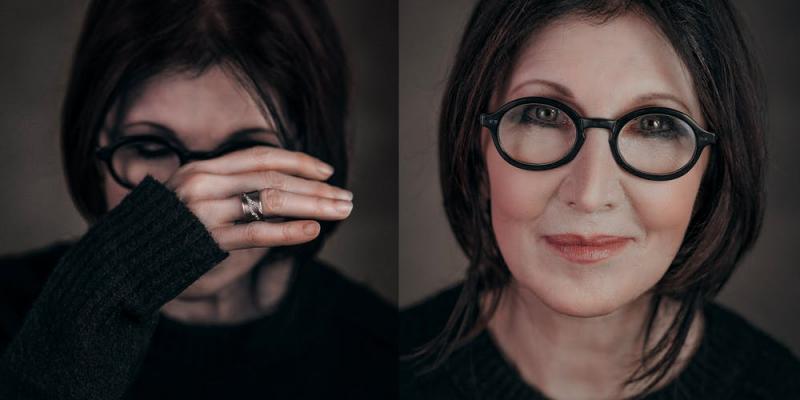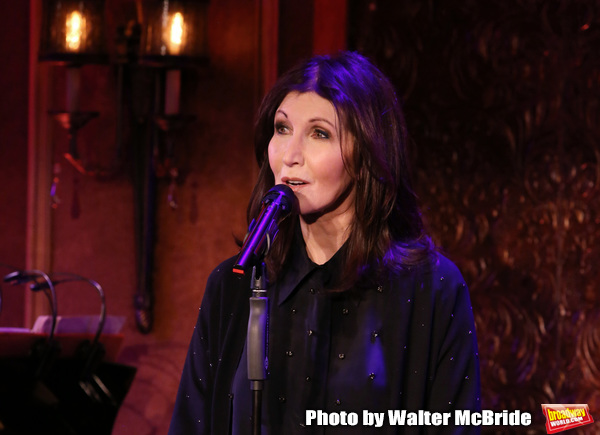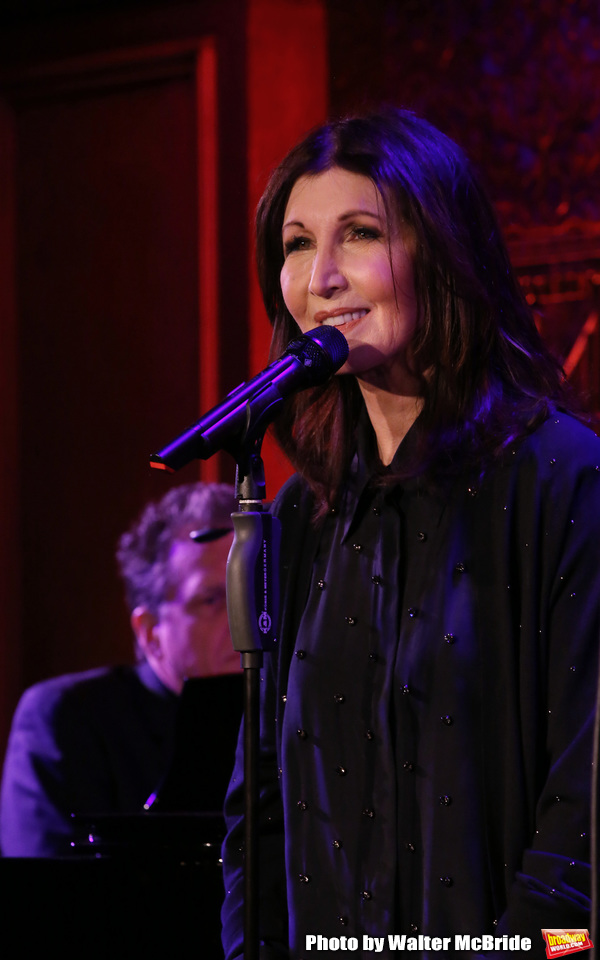Interview: Joanna Gleason Rekindles Her Light At Feinstein's/54 Below With OUT OF THE ECLIPSE

Photo: courtesy of the artist
In case you need to hear it, Joanna Gleason is here to remind you that everything is going to be okay.
After a three-show run in March, she returns to Feinstein's/54 Below this week with OUT OF THE ECLIPSE. This is the second solo show at the venue for the Tony Award winner, who garnered the prestigious award in 1988 for her role as the Baker's Wife in INTO THE WOODS and has been nominated twice more for A DAY IN THE DEATH OF JOE EGG and DIRTY ROTTEN SCOUNDRELS.
Her first cabaret, in 2013, fit into the archetype of what you would expect from a first-time celebrity solo show: the obligatory career hits and former co-stars as special guests. With OUT OF THE ECLIPSE, Gleason goes deeper, diving into the lives and loss of her parents, Monty and Marilyn Hall, who passed away within months of each other in 2017, and the dark time she had to get through to come back into the light. With arranger and music director Jeffrey Klitz, as well as her band and backing vocalists, she relates a story that is both deeply personal and universal.
Ahead of the returning three-show run, Gleason sat down for a phone interview with BroadwayWorld to discuss her love-and-understanding letter to her parents and the lessons loss (and performing after loss) has taught her.
This interview has been edited for content and length.
You did your first cabaret at 54 Below five years ago, is that correct?
I think it was 2013, so it was maybe almost six years ago. That was the first one I had ever written and the first time I had ever done it. Really, without ever seeing it or anything, when I mentioned I was interested, it was [then-Director of Original Programming] Phil Bond who said, "Here--- here are three dates." And then, they had us back for three more dates not long after that. This time, when I just felt this show starting in me, I knew I wanted to write something and I wrote [current Programming Director] Jennifer Tepper, and she wrote back with three March dates. So, I thought, "Well, I really have to write this (laughs)."
This new show isn't really the kind of "greatest hits" concert that a lot of people expect from Broadway performers doing solo cabarets.
Exactly. The first one I ever did, I felt obliged: there was a kind of expectation to do songs from INTO THE WOODS and from NICK & NORA. Chip Zien joined me once, Jimmy Naughton from I LOVE MY WIFE, my first show, came up. So, I did feel that kind of obligation. Even though there's a big set piece about NICK & NORA---my husband [Chris Sarandon] joins me in this one---that's very funny, that's really the only thing about "my career" that's in this show.
I know the bones behind the show and its title, but I want you to be able to share in your own words how it all came to be.
I wanted to do another show because I enjoyed the experience so much. I am not one of those great cabaret singers who has all the great charts and the great songs and is just as comfortable as can be, but something about 54 Below made it so comfortable for me that I thought, you know, I've just gone something very tough, in that I lost both my parents very close together---really, weeks apart---and it had been a very long process of going back and forth to California and it brought up so much stuff and it was hard and exhausting and grueling and difficult that I thought I want to write a show.
But I didn't realize I was gonna write a show about them. I actually thought I was just going to write something funny and, you know, "Here we are in America and we're all getting old, and what's happening?" But everybody's doing that and that ground has been covered so much. I felt this thing become very personal and the song choices become very personal and actually realized that I had stories to tell that were very funny, and also what it did to me at this time in my life and, when I plunged into this darkness, how I climbed out. And it's wonderful what was all around me that I couldn't see until I put this show together.
Your parents passed away in 2017?
Yeah, in 2017.
How soon after their deaths had you begun working it? Did you have space for a while?
I had a year, and in that year, it's like you're swollen and the swelling doesn't go down for a while. So, you do all the things--- I actually say in the show that I seemed okay. I could laugh, I could be with friends, but [there was] something I hadn't gotten to that you really can't get to until later. It's so funny what you hang onto and what you don't hang onto, and anything in my entire life with them that would've annoyed me or, "(Dramatically) Oh, this was when they did this and these are the scars I carried from them," I could not hang onto any of it because what came in were the amazing stories about who they were and their lives and, then, who they were to us.
So, it's not a memorial, it's a love letter. It's an understanding letter to who they were. I don't think people really know their parents until they get some distance.
I've been thinking about that a lot lately, actually: I just had a long weekend with my dad, who's getting older and which can be difficult to see... we pull so much from our parents. I know there are entire aspects of my career that were formed because of things I did with my dad as a kid or his levels of support, either positive or negative. Then, you get older, they get older, you process those things differently, and they speak to you in those different ways.
That's right. And when you get older, you start to deal with stuff as an older person when you realize, "Oh, they were dealing with all this stuff, too, and having to deal with me (laughs)." There was just no way that their life was a simple, straight line.

And it becomes so core to you that when you tell your own stories, their stories are also your stories.
That's right. You know, what happened in March when we first did this show was that people sit at 54 Below sometimes in booths or at tables with people they don't know. The show was over and I came into the audience, and people who did not know each other were sitting and talking about these kinds of shared memories of their own and what they've been through. And some people didn't want to leave and people were laughing and people that I would not have expected to be moved were very moved. And I thought, oh, the more personal I make it--- I don't talk about my parents. I almost never mention their names [in the show] because, then, you have a picture in your mind, and this way, it's more available for people to think about their own families.
Sure. It's obviously a very personal show, but that idea of using music and stories to reckon with loss and grief is very universal.
Also, there's a lot in the show about twists of fate... wacky twists of fate, even down to how I'm even here at all, which is a very funny story. And there are a lot of very funny stories in this thing. But I started to see all the little pools of light all the way back to my great-grandparents that led me to be standing on the stage and telling these stories, all the coincidences and the twists of fate and the leaps of faith and some of the crazy, "Well, I can't believe that happened," and the things in life that you take for granted that you start to see were kind of amazing.
In not really mentioning their names and trying to keep it as accessible to people as possible, how did you decide what kind of stories you were going to tell throughout the show and the way you were going to paint the picture?
My mother and father had very distinct personalities, and my father was an exceptionally funny man but, I mean, kind of laid-back funny. Even the last years were--- it's actually on my poster that my grandmother used to say, "I'm laughing on the outside, but inside, a leg is breaking." My family puts love first and then humor [and] laughter second because they've been through so much. They teach you, no, you've got to find the thing that is just to laugh.
Do you carry that philosophy, as well?
I do. I do because it also minimizes the crap you have to lug around with you, and if you just keep replaying the old tapes and if you just keep wearing things as scars and wounds, then there's no room for inspiration. There's no room for real joy.
You did the show back in March. Has anything changed or evolved at all over the spring?
Yes, it has. I realized the one thing I hadn't really touched on in the March show was what it did to me. I talk about them and how they handled it... and there were funny things and sweet things and touching things and magical things. But then, there was a moment where I turned to Jeffrey Klitz, my music director, and I said, "I'm missing the undertow." This show is going to play a 700-seat theatre at Fairfield University at the Quick Center in November, it's going to California to a 250-seat theatre--- it's a theatre piece. It really is a theatre piece. And because it's a theatre piece, I think I've had room in the "second act"... to add another terrific story. I actually added two fantastic stories, one of them very funny, and then this other story, which leads into a very big production number. There's not a lot of just straight songs. I sing about five songs straight through as numbers, but they are part of the narrative. This is a real scene with a major song in it, and it's, eh, four minutes of the show, but it goes deep. And then, from that, when I pull out and I come to the part that's about perspective and a little miracle at the end and then an upbeat...it made the show feel whole. So, yes, this is 2.0. This is the 2.0 version.
As far as the music, it's very richly orchestrated, and then you have this very interesting setlist, which is very lush and eclectic.
I have three singers, the Moontones, and I have piano, guitar, mandolin, percussion---but not a drum kit, a very inventive percussion by Shane DelRobles---and a beautiful cello. And it sounds so full on stage, and it's really four musicians and three singers. [The setlist] is eclectic, but it goes exactly where we are in the story.

Was there a specific kind of sound you were looking for?
I knew that it wasn't going to sound like [a show] you would hear in a nightclub with a piano and a singer. I knew that it was going to be more like you were at a very intimate musical. And if people are not familiar, there are songs in the show, especially what we've added, or musical snatches that are very familiar, but the bulk of it, it's a lot of stuff people don't know that well. So, it's like going to a show where there's a new score that you've never heard. To that end, it's not that you're going to sing along (laughs), but there are places where your ear will rest because the tune is familiar or the snatch of tune we use is transition music is familiar. And, of course, some of the big numbers are well-known but in a brand-new context.
My son [singer-songwriter Aaron Gleason] sent me a song and he said, "I think you're going to like this." It's called "Sister Rosetta Goes Before Us." There are two versions; Sam Phillips did one and I think Alison Krauss did one. I listened to it and I thought, "...Oh yeah, this says something. And there's a Kurt Weill song and there are two Rodgers and Hart songs and then there's a James Taylor and there's a Yiddish song in there. It's eclectic. There are even snatches of stuff that nobody's ever heard which just are funny to me to keep the show moving, but no song is really just to sing a song.
You said you were missing that piece in the first shows of how it affected you. What have you learned in these past couple years and while doing this show?
I've learned that grief has no timeline and my parents... I miss them so much. I'm not young; I'm 69 years old, and I've had my parents for 67 years of my life, which is extraordinary. They were 90 and 96, and yet, they were very with it and we were very much a part of each others' lives and we were very much in communication. They were contemporary and they were funny and smart. I went from missing my mother and father to missing having parents. Suddenly, I don't have parents. I have a lot of children and grandchildren and you become the buffer. You become the, "Do you have the answers?" and "Can you tell us how it's going to be?" and "Will everything be okay?"--- the great assurances and explanations. We have really intelligent kids and they're all in their 30s and 40s, and yet, you feel the responsibility of being the elders. I used to be able to pick up the phone and just say to dad, "Oh my god... what's going on? Are we gonna be okay?" And he'd say, "Yep, it's a blip. We're gonna be okay." I miss that.
But now, you get to be the one to say to everybody, "It's a blip. It's gonna be okay."
Yeah. It's gonna be okay.
Joanna Gleason will return to Feinstein's/54 Below with OUT OF THE ECLIPSE on July 2, 5, and 6. For tickets and information, visit www.54below.com.
Ashley Steves is BroadwayWorld's Cabaret Editor-in-Chief. You can find her on Twitter and Instagram at @NoThisIsAshley.
Comments
.png)
|
.png)
|
Videos


